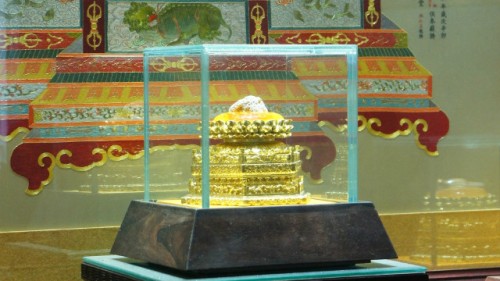April 23rd, 2012
By Vicky Kung, for CNN
Hong Kong (CNN) – A skull bone believed to be from the original remains of the Buddha will be on display in Hong Kong for six days, the first time the relic will be displayed outside mainland China.
The parietal bone will be enshrined for worship at the Hong Kong Coliseum from April 25 to April 30. China is sending the relic to celebrate the 15th anniversary of Hong Kong’s return to China, said Venerable Yin-chi, the secretary general of the Hong Kong Buddhist Association. The display also coincides with the World Buddhist Forum in the city and Buddha’s birthday, celebrated in Hong Kong on April 26.
“The Chinese government had sent us the Buddha’s tooth once in 1999 and the finger bone once in 2004,” Yin-chi said. “But this is the first time that the parietal bone is being moved away from the mainland for a public worship.”
Like the great panda, Buddha’s bones are often sent as a gesture of diplomatic friendliness to countries where Buddhism thrives.
China, India, Sri Lanka, Cambodia, Singapore and Taiwan possess bones or teeth purported to be relics of Sakyamuni Buddha, the founder of Buddhism. In 2011, India lent relics to Indonesia for the 2,600th anniversary of Buddha’s enlightenment. China, which has most of the relics, has lent bones to South Korea, Thailand, Myanmar, Taiwan and Hong Kong.
The skull fragment, unearthed in 2008 at the Grand Da Bao’en Temple in Nanjing, China, is described as the “highest spiritual object in Buddhism” by Venerable Hong-ming, the executive vice president of the Hong Kong Buddhist Association.
“ ‘Buddha’ literally means ‘the awakened one,’ ” Yin-chi said. “In Buddhism, we do not believe in a god who is the creator, but we strive to be spiritually awakened, like Sakyamuni did with his supernatural wisdom. The cremated remains of the Buddha are encouragement to all Buddhist followers who want to be awakened, so the bones are highly venerated.”
Together with the Buddhist Association of China and the China Religious Culture Communication Association, The Hong Kong Buddhist Association will organize a “Grand Blessing Ceremony” to welcome the relic to the city.
“We sometimes call the Buddha’s birthday the Bathing-Buddha Festival,” Yin-chi said. “Believers sprinkle water on the infant statue of Sakyamuni to commemorate his birth. This is because according to the legends, nine dragons sprayed water when Sakyamuni was born. The rain symbolizes the cleansing of one’s soul and purity.”
Hong Kong first included the Buddha’s birthday on its list of public holidays in 1999, two years after its reunification with China.
“The official acknowledgement might be one reason why Buddhism blossomed in Hong Kong,” Yin-chi said. “Such publicity helps, but Buddhism was pervasive here long before 1999. More and more people believe because Buddhism inspires people who are looking for the meaning in life.”


No comments:
Post a Comment